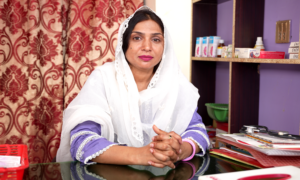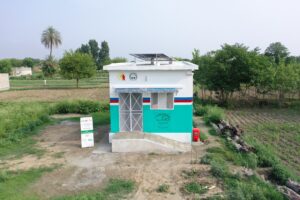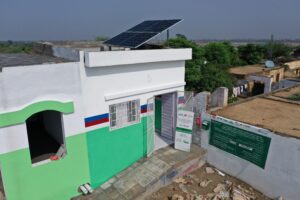In the heart of Pakistan, where access to healthcare and family planning options can be limited, DKT Pakistan is igniting a transformative change. With an ambitious goal, the organization is set to unveil 200 new Dhanak Health Care Centres (DHCCs) across 20 districts in Khyber Pakhtunkhwa (KPK) and Punjab, all under the groundbreaking Self-Empowerment for Women (SEW) project.
Backed by the support of KfW Development Bank and German Cooperation, DKT Pakistan is expanding its network of over 1,500 existing clinics; pioneering a movement to bring compassionate healthcare to the most remote corners of the country. These new, one-room clinics are designed to deliver essential services with a personal touch, building on the success of previous initiatives and the invaluable experience gained. As DKT Pakistan reaches out to underserved communities, it’s not just about healthcare—it’s about empowering individuals and transforming lives.
Central to this initiative is a collaboration between DKT Pakistan’s community managers, who ensure that each clinic is equipped with the right providers and resources, and the network of midwives that currently serve last-mile communities in the targeted regions.
In Punjab, Zeeshan identifies suitable community midwives (CMWs) and then works with district coordinators and social organizers to engage potential candidates, ensuring they are both qualified and committed to the project. Zeeshan’s effort is not easy, as progress is complicated by the diverse attitudes toward healthcare across regions. Metropolitan areas often have a different approach to healthcare compared to rural areas, where traditional views and male dominance can present significant challenges.
“Convincing male leaders and community members of the benefits of family planning requires a great deal of persuasion and sensitivity,” Zeeshan said. Community managers must ensure that the land designated for clinic construction is free from disputes to prevent any complications later in the approvals process. To do this, they need to obtain a No Objection Certificate (NOC), which is essential to preventing disputes over property use, ensuring transparency and community acceptance in the community.
Tahira is a health provider serving clients in the new communities in the SEW project. She said the practical applications of her training have made the biggest difference in her ability to both serve patients and operate the new clinic.

Tahira, a health provider, says DKT’s trainings have allowed her to deliver essential care and support in her community
“We have been given the opportunity to come on a proper platform and provide training to develop our skills with the latest techniques,” she said. Tahira said she has built her expertise through hands-on practice and now aims to treat patients effectively, guiding them on family planning and providing essential care. “I will treat patients according to their condition, whether they need antenatal or postnatal care. I want to help those in my community who have no good clinics nearby and offer guidance to young girls struggling with period issues.”
In Khyber Pakhtunkhwa, Shahzaman manages a similarly intricate selection process. Starting with lists provided by the government, Shahzaman shortlists potential providers based on their qualifications and the suitability of their practice locations. The process includes extensive consultations with community leaders addressing concerns about the clinic’s purpose. Approvals are further compounded by environmental and logistical issues. An estimated 90% of training takes place in rural areas, so Shahzaman and his team regularly navigate hurdles such as poor mobile connectivity, extensive travel, and local disputes.
Land disputes and security issues, including terrorism, make it difficult to attract and retain
qualified staff, he said. The selection process for 64 of the clinics in KPK involved visiting approximately 150 community midwives over several months – a process that is often hindered by delays due to government approvals and funding.
Both Zeeshan and Shahzaman emphasize the importance of ongoing support and training. Regular visits by community health officers (CHOs) and tailored educational programs are crucial for maintaining high standards of care.
“Our commitment to training extends beyond initial setup; we provide continuous support to ensure that providers are well-prepared to meet community needs,” Shahzaman said.
The dedication of providers like Yasmeen and Tahira further illustrates the impact of DKT Pakistan’s initiatives. In Haripur, Yasmeen, a community-based midwife, said DKT’s work has expanded her skills in ways she did not expect.
“Previously, we only used to do deliveries, but DKT Pakistan has taught us about family planning. Dhanak and DKT empowered us with knowledge to advance our scope.”
Yasmeen’s involvement includes organizing camps and awareness programs, a testament to the practical training she has received.
“When we were CMWs, we worked with Ma’am Shehla, our supervisor, who works with DKT Pakistan as a CHO. She referred me to work here, which was a better option than struggling to get a loan for my own setup,” she said.
 As DKT Pakistan continues to expand its reach with the introduction of 200 new Dhanak Health Care Centers, the journey reflects a profound commitment to improving healthcare in Pakistan’s most remote regions. The resilience and dedication of individuals like Zeeshan, Shahzaman, Yasmeen, and Tahira demonstrate that transformative change is achievable, even in the face of daunting challenges.
As DKT Pakistan continues to expand its reach with the introduction of 200 new Dhanak Health Care Centers, the journey reflects a profound commitment to improving healthcare in Pakistan’s most remote regions. The resilience and dedication of individuals like Zeeshan, Shahzaman, Yasmeen, and Tahira demonstrate that transformative change is achievable, even in the face of daunting challenges.
Their collective efforts reflect the organization’s ability to overcome significant barriers and bring essential services to those who need them most, one clinic at a time. Each new Dhanak Health Care Centre is more than just a facility; it is a beacon of hope and a testament to the power of empowered individuals working together to improve lives. The initiative stands as a powerful example of how strategic planning, community involvement, and unwavering dedication can overcome obstacles and pave the way for a brighter, healthier future for all.

